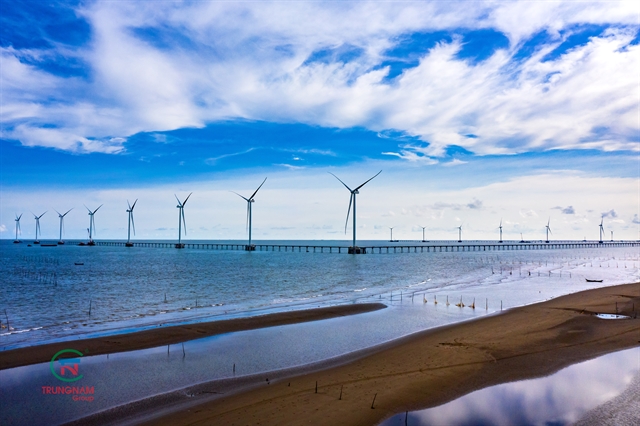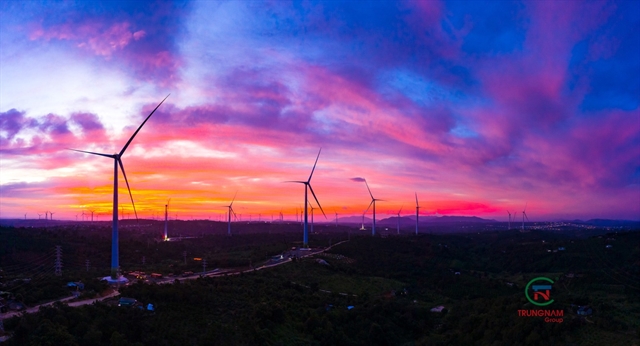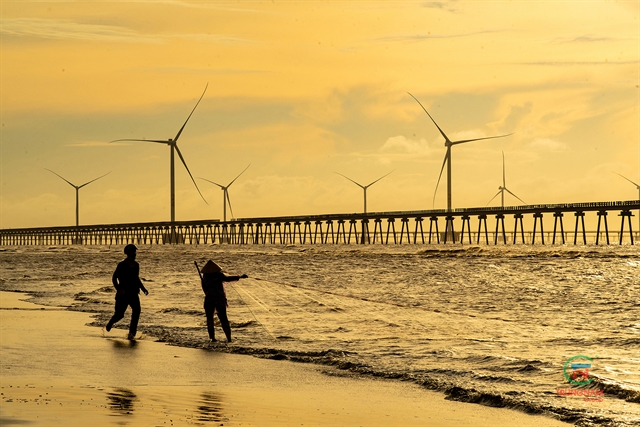
HÀ NỘI — Trungnam Group (TNG) promotes the search for and investment in sustainable and safe power projects, working alongside government and significant economies throughout the world to achieve the objective of generating environmentally friendly energy.
Việt Nam's largest renewable energy investor
According to data from the Ministry of Industry and Trade (MoIT), the total installed capacity of power sources in the country reached 69,342 MW by the end of 2020. In particular, wind and solar power plants account for roughly 25 per cent of installed capacity (more than 17,000 MW). By end of October, thousands of MW of wind power projects were also put into commercial operation, greatly expanding wind power in the total capacity of the country's electricity sources.
When the private sector invests in the majority of projects, the participation of private businesses is an essential milestone in the development of renewable energy projects in Việt Nam. In this regard, TNG is the company with the most renewable energy projects in Việt Nam.
TNG has 1,492,1 MW of renewable energy projects contributing to the national electricity grid as of October 31, 2021, with seven projects invested in and operational throughout provinces and cities. They are: Ea Nam wind power (400MW), Phước Hữu wind power (46.2MW), Trà Vinh wind power (100MW), Thuận Bắc wind power (151.9MW), Thuận Bắc solar power (204MW), Thuận Nam solar power (450MW), and Trà Vinh solar power (140MW).
TNG contributes 1,610,1MW to the country's electricity capacity when combined with three hydroelectric plants: Đồng Nai 2 (70MW), Krong No 2 (30MW), and Krong No 3 (18MW).
TNG has three significant projects in Ninh Thuận, including the wind and solar power complex, the Trungnam Thuận Bac solar power plant, and the Phước Hữu wind power project.
Notably, despite the challenges posed by the COVID-19 pandemic, TNG has committed to constructing three large wind power projects with a combined capacity of up to 546.2 MW in three separate locations of Đắk Lắk, Trà Vinh, and Ninh Thuận by the end of this year.
All three projects were completed by the end of October, with the Ea Nam Wind Power Project (Đắk Lắk) becoming the largest onshore wind power plant project in Việt Nam, with a capacity of 400MW, and the Đông Hải 1 Trà Vinh project becoming the largest offshore wind power project in Việt Nam, with a total of 100MW.
Wind Power Plant No. 5 - Ninh Thuận contributes 46.2MW, raising the total capacity of Renewable Energy plants in Ninh Thuận to 852,1 MW. TNG is also an enterprise that contributes significantly to Ninh Thuận becoming the country's renewable energy centre.

Nguyễn Tâm Tiến, Trungnam Group's CEO said: "With our existing capacity, Trungnam Group is an energy investor with the largest capacity projects in Việt Nam."
TNG's projects are always efficient since we focus on utilising renewable energy sources in strategic areas, thereby boosting economic development and contributing to the common objective of maintaining energy security. Moreover, TNG will continue to develop these works with the strength of effectively implementing renewable energy projects to optimize natural resources for the country's socio-economic development.
Focusing on sustainable and safe energy development
According to energy experts, Việt Nam has huge potential for renewable energy. Therefore, developing renewable energy is critical. Furthermore, given the numerous objections to coal power projects, Việt Nam should enhance investment in thermal projects to have electricity running in the background as a foundation for developing renewable energy, such as liquefied natural gas; a type of energy is believed to be significantly more environmentally benign than coal power.
In addition, the MoIT forecast in the draft power plan 8 to significantly raise the proportion of liquefied natural gas electricity in the overall capacity of power sources. As a result, by 2025, the capacity of gas thermal power (including LNG) will be 14,117 MW, accounting for 13.4-13.7 per cent of total capacity; by 2030, the capacity of gas-fired thermal power plants will increase dramatically, rising to 27,471-32,271 MW, accounting for 21.1-22.4 per cent of total capacity. Gas thermal power capacity will continue to grow, accounting for 23.5-26.9 per cent of total capacity by 2045.

This worldwide movement will contribute to the increased use of environmentally friendly power sources in the Vietnamese electricity system.
Many plans exist to invest in liquefied natural gas, according to Tiến: "During the development process, we are continually upgrading the latest technology in the globe to implement in projects.
"With the economy's continuing growth and the mindset of a leading firm in the energy industry, we are mindful of our responsibility in assisting the government in meeting its carbon reduction target. That is also why TNG is now studying and constructing LNG projects in potential locations."
At the same time, TNG is actively working with partners to develop contemporary energy storage systems, methods to manage exploited energy resources to maximize value, and direction for future energy exports.
"The development of LNG power in the localities is a new step to demonstrate that TNG is very passionate about finding and investing in safe and sustainable energy sources. We will be accompanying the Government and other stakeholders’ economies around the world towards an environmentally friendly energy source," said TNG's leader.— VNS